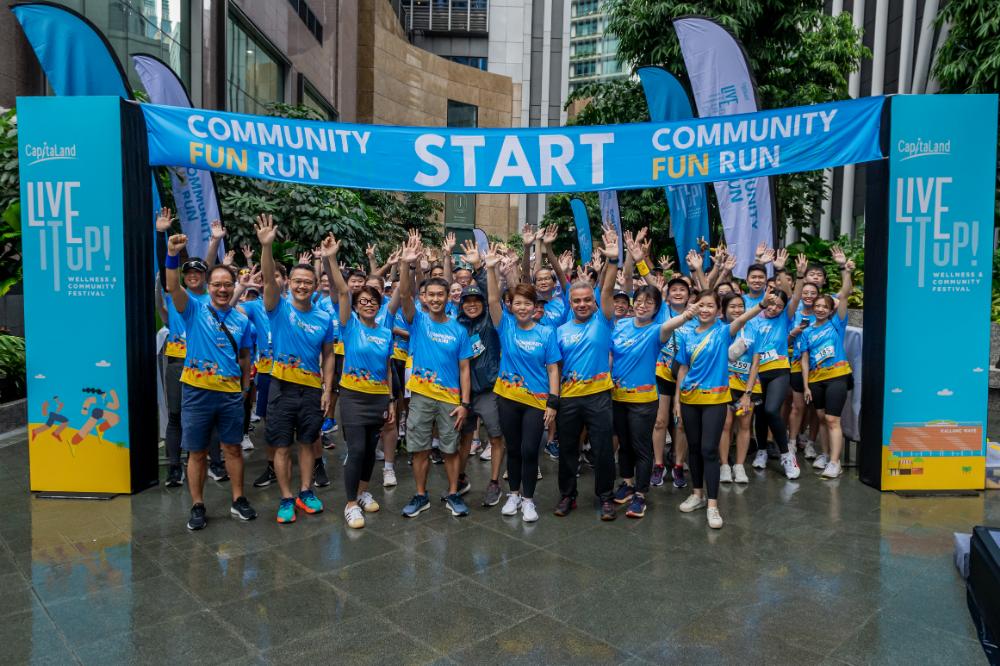Sustainability
ESG Focus
Social
Read the full report about CICT's Social in our Sustainability Report 2024 here.
Framework
- Occupational Health and Safety (OHS) of staff
- Health and safety of stakeholders (tenants, shoppers, guests, and the public) at its properties
- OHS in Supply Chain Management
- Promote the culture of individual ownership and responsibility for Occupational, Health & Safety (OHS) management from top management and staff to stakeholders, including tenants and supply chain partners such as vendors, service providers and main contractors
- Actively participate in industry and national programmes to raise OHS standards
- Reduce occupational injury rates to achieve zero harm
- Continually strengthen the robust OHS Management System to meet and exceed OHS legal requirements
CICT is aligned with CapitaLand's Social charter and various policies which uphold fundamental principles of human and workplace rights. These policies outline principles to protect individual rights with a zero-tolerance stance towards child/forced labour, diversity, equity and inclusion across the organisation.
To find out more:
- CapitaLand Social Charter
- CapitaLand Diversity, Equity & Inclusion Policy
- CapitaLand Harassment Policy
- CapitaLand Supply Chain Code of Conduct
CLI incorporated sustainable procurement principles in the CLI Procurement Policy. This is in alignment with the company's sustainability commitments as a signatory to the United Nations Global Compact (UNGC). CICT operates under the guidelines of the CLI Procurement Policy, ensuring that all supply chain providers are rigorously assessed during the admission and pre-qualification stages for their capability to align with our robust sustainability practices. Once onboarded, these suppliers are subject to regular evaluations to ensure ongoing adherence to our procurement standards. Instances of non-compliance are promptly identified for corrective action, with suppliers presenting high sustainability risks and performance discrepancies receiving intensified monitoring for improvements. Any supplier found to be in violation or attempting to violate anti-corruption laws will face immediate contract termination.
CICT continued to screen its supply chain to ensure that relevant business and ESG risks are being managed appropriately. CICT identifies critical suppliers as high-spend suppliers, non-substitutable suppliers or critical business component suppliers such as term contractors providing facility maintenance and property management services, IT service providers, and contractors for construction works. The sustainability performance of critical suppliers, especially in terms of workplace safety, are monitored and disclosed.
To further strengthen our supply chain management, CICT leverages CLI's subscription to an external platform that conducts ESG due diligence screening on suppliers based on publicly available information. Suppliers are screened and rated based on the risk and resilience of each ESG factor, which include corruption, human rights, politically exposed parties, sanctions, safety, environmental regulation breaches, etc. CLI had piloted the screening of close to 500 critical suppliers in Singapore, China and India in 2022. A total of 17 suppliers were rated with high ESG scores. This pilot enables CLI to monitor its suppliers' ESG performance and potentially establish a capacity building programme for improvement.
Human Rights
CLI has a Social Charter (see link to the extract above under CapitaLand Policies) which sets out commitments to support the preservation of human dignity and self-respect of every individual. It covers human rights, child labour, forced labour, human trafficking, code of conduct, diversity and inclusion, and healthy work-life balance. The Social Charter applies to all employees and guides the company towards ensuring a supportive and respectful environment for individuals across all aspects of the business and operations.
Anti-Child Labour And Anti-Forced Labour
CLI is a signatory of the UNGC. CICT is aligned with its commitment to the 10 principles in human rights, labour, environment and anti-corruption. These 10 Principles of the UNGC are derived from the Universal Declaration of Human Rights, the International Labour Organisation's Declaration on Fundamental Principles and Rights at Work, the Rio Declaration on Environment and Development, and the United Nations Convention against Corruption. CapitaLand signed the Employers Pledge for Fair Employment Practices with the Tripartite Alliance for Fair and Progressive Employment Practices (TAFEP)1 in Singapore and is committed to the five key principles of fair employment of:
- Recruit and select employees based on merit, such as skills, experience or ability to perform the job, and regardless of age, race, gender, religion, marital status and family responsibilities, or disability.
- Treat employees fairly and with respect and implement progressive human resource management systems.
- Provide employees with fair opportunity to be considered for training and development, based on their strengths and needs to help them achieve their full potential.
- Reward employees fairly based on their ability, performance, contribution and experience.
- Abide by labour laws and adopt the Tripartite Guidelines, which promote fair employment practices.
CICT adopts a zero-tolerance stance regarding child labour, forced labour and unlawful discrimination and had no reported incidents of such in 2023. There were no employees below the age of 16.
Fair Remuneration
All employees have signed employment contracts with the key employment terms and conditions clearly defined. This allows employees to understand both their rights and obligations, as well as those of the company, thus minimising potential employment disputes in the future. Key employment terms specified in the employment contract include job title and description, duration of employment, working hours, salary and statutory contributions/ deductions, leave entitlements, probation and notice periods, and key insurance and medical benefits, etc.
To ensure that CICT remains competitive and continues to attract, motivate and retain the right talent, we leverage CLI's engagement of external independent remuneration consultants to evaluate and compare employees' compensation packages against comparable markets benchmarks. Salaries are reviewed against the benchmarks, taking into consideration the specific job scope and responsibilities of each employee. All employees will undergo an annual performance review with an open discussion on the employee's performance, areas for improvement, developmental needs and career plans.
CICT offers comprehensive and competitive compensation packages to reward and motivate employees. The company has a pay-for-performance philosophy that rewards for superior performance and aligns employee interests with those of unitholders. The overall annual variable bonus pool for employees is determined based on the Trust's achievement against a holistic set of quantitative and qualitative targets in the Balanced Scorecard dimensions of Financials, Execution, Future Growth, Talent Management and Sustainability (including ESG factors). The bonus amount awarded to individual employees are determined based on their individual performance and relative contributions during the year. The bonus awarded to eligible managerial grade employees will be a combination of cash and deferred shares units, which will be vested over three equal annual tranches. Senior management are granted additional share units that are subjected to a three-year performance period and will be vested if the predetermined performance conditions are achieved. The performance conditions include measures and targets on total unitholder return and ESG.
Parental Leave
Eligible employees are entitled to parental leave, in line with the leave eligibility and entitlement set by Ministry of Manpower Singapore. CICT also provides family event leave to eligible Singapore employees to attend to family related activities. This is over and above the legal requirement.
Retirement and Rehiring
CICT is committed to providing meaningful jobs and talent mobility where employees are given opportunities to rotate across different job functions, subject to competency requirements and business needs. This is in line with the various Tripartite Guidelines and Advisories issued by the Singapore Ministry of Manpower together with its tripartite partners, Singapore National Employers Federation and the National Trades Union Congress. CICT has a re-employment policy of extending employment to employees who have reached the mandatory retirement age but are still able and willing to continue contributing to the REIT. This policy is applicable to all staff globally.
Talent Management
At CICT, we seek innovative, dynamic and talented employees to drive the company's next phase of growth. We adopt a multi-pronged approach to workforce planning and continuously build our management bench strength by identifying high-potential talent through our succession planning process. The Board's Nominating and Remuneration Committee regularly reviews the succession plans for the key positions in the Manager of the Trust, including the Chief Executive Officer and other key management personnel in CICT. Annually, CICT identifies and reviews suitably qualified candidates who may be considered for key positions to meet immediate, medium, and long-term organizational needs.
Grievance Handling
The Grievance Handling Policy establishes a fair, transparent, and structured approach to addressing workplace grievances, underscoring the organisation's dedication to creating an inclusive, respectful, and harmonious environment. The policy integrates principles outlined in our Diversity, Equity, and Inclusion (DEI) Policy, Social Charter, and Harassment Policy, ensuring that all employees are safeguarded against discrimination, harassment, and breaches of fundamental workplace rights.
The policy defines the scope and applicability, allowing employees to report cases that do not constitute serious misconduct, legal violations or ethical breaches through the grievance reporting channel. They may include discrimination, harassment, human rights concerns, workplace disputes and employment concerns. The process is outlined to address workplace concerns fairly and efficiently through informal discussion, formal grievance submission, and internal appeal.
All records will be securely kept by HR to ensure privacy and confidentiality.
Reviewed periodically, this policy applies to all employees and is accessible on CapitaLand's intranet.
- CEO of the Manger is accountable for OHS performance
- All staff are accountable for OHS performance and implementation through ISO 45001 certified OHS Management System
- Key performance indicators (KPIs) are linked to remuneration of all staff, including management; performance is tracked and disclosed regularly
- Ensure legal compliance
- Identify hazards and assess risk
- Adopt CLI Sustainable Building Guidelines (SBG), including the Environment and Social Impact Assessment (ESIA)
- Execute safe operations through OHS Standard Operating Procedures (SOPs)
- Prefer ISO 45001 certified supply chain; attainment of national certification may be accepted e.g. bizSAFE Level 3 and above for Singapore
- Appoint ISO 45001 certified main contractors, or require OHS legal compliance audit
- OHS performance of staff and supply chain (e.g. vendors, service providers / contractors / suppliers)
- Stakeholder engagement
- Support and participate in national OHS programmes
- Share CapitaLand Environmental, Health & Safety (EHS) policy with supply chain partners
- Encourage key stakeholders, including tenants, shoppers, guests, and the community to adopt safe and healthy behaviour
Our Aim
To understand our shoppers' needs, enhance their experiences and improve the appeal of our malls
Engagement Channels
- Marketing and promotional events
- Loyalty programmes
- Online and mobile platforms
- Social media platforms
- Shopper interviews
- Quarterly email messages from CEO, Commercial Management
Focus Areas
- Safe Environment: high quality and well-managed malls with amenities such as family-friendly facilities
- Delightful Shopping Experience: omnichannel and experiential shopping with new retail concepts
- Sustainable buildings: universal design and green features
Response
- Maintain efficient, green-rated properties
- Curate and optimise tenant mix and reconstitute portfolio proactively
- Leverage technology and digital platforms such as CapitaStar’s ecosystem to build loyalty
- Co-create concepts with tenants
Our Aim
To contribute to the communities and be a responsible corporate citizen
Engagement Channels
- CHF collaboration to contribute to non-profit organisations
- ESG management
- Corporate social responsibility programmes
- Membership in national initiatives that promote sustainable buildings, and health and safety such as BCA Green Built-Environment Advisory Committee, and the Workplace Safety and Health Council
Focus Areas
- Sustainable buildings: universal design and green features
- Community engagement: employee volunteerism and community programmes to raise awareness on various topics
Response
- Pursue green ratings for all properties in the portfolio
- Grant three days of volunteer leave per employee
- Participate actively in community programmes with social/charity objectives
- Partner with government/national agencies and tenants to promote sustainability and healthy living
Our Aim
To be the landlord of choice by understanding our tenants' needs, enriching their workplace experiences, and fostering vibrant communities with a sense of belonging
Engagement Channels
- Programmes and activities
- Office Tenant Relations Specialists and Key Account Managers
- Meetings with key existing and new tenants and other informal tenant gatherings, such as shop/office openings
- Joint promotions and strategic partnerships
- Monthly newsletter "your Workplace Community"
- Social media platforms
- Post-event feedback
- Half-yearly email messages from CEO, Commercial Management
Focus Areas
- Safe Environment: high quality and well-managed offices with amenities
- Sustainable buildings: universal design and green features
- Partnerships: customer engagement and cross sharing
Response
- Maintain efficient, green-rated properties
- Curate and optimise tenant mix and reconstitute portfolio proactively
- Leverage technology and digital platforms such as CapitaStar’s ecosystem, including its mobile application CapitaStar@Work, to extract synergies and cross-selling opportunities
- Regular engagement with tenants to build relationships and ensure prompt responses to their needs
Our Aim
To provide timely and consistent communication to Investors and be a choice investment
Engagement Channels
- CICT website
- Annual general meetings
- SGXNet announcements
- Annual reports
- Sustainability reports
- Biannual media and analysts results briefings
- Analyst group calls
- Roadshows, conferences, meetings, teleconferences
- Property visits
Focus Areas
- Growth: sustainable long-term returns
- Accountability: communicate performance, strategies, risks and opportunities
Response
- Reconstitute portfolio proactively
- Manage assets and portfolio proactively
- Manage capital prudently
- Uphold strong corporate governance
- Create value via a disciplined approach to acquisitions and divestments
- Seek and evaluate investor feedback
- Commit to annual sustainability reporting
- Participate in GRESB real estate assessment annually
- Build win-win partnerships
Our Aim
To develop a highperformance work culture that embraces diversity and teamwork
Engagement Channels
- Formal and informal staff communications
- Employee engagement programmes, including volunteer and recreation activities
- Employee engagement surveys
- Performance feedback and appraisals
- Teambuilding workshops and training courses
Focus Areas
- Engagement: regular staff engagement for reward & recognition
- Development: work-life balance, training & development, health & well-being
Response
- Host regular staff communication sessions to communicate financial performance, strategy, target performance indicators
- Conduct annual performance review and identify training and development goals
- Monitor occupational health and safety issues
- Identify action plans to improve employee welfare and well-being
- Conduct annual training on FBC awareness. For 2024:
- 100% of CICTML employees completed the training
- 97% of CICT employees completed the training
Our Aim
To be a fair and reasonable buyer of goods and services and share industry best practices
Engagement Channels
- Term contractor/vendor evaluation system
- Supplier collaboration to manage EHS challenges
- Facilitate supply chain compliance to internal standard operating procedures such as CLI's EHS Policy
Focus Areas
- Engagement: regular engagement and feedback channel for improvements
- Compliance: EHS objectives & OHS practices
Response
- Recognise supply chain partners for exceeding standards in service quality via the CLI's HOST Programme
- Collaborate to manage EHS challenges such as an epidemic outbreak
- Monitor and report EHS performance quarterly
- Evaluate term contractors and vendors half-yearly and engage in feedback sessions for continuous improvement
- Share CLI’s Supply Chain Code of Conduct with suppliers which sets out the
requirements in the areas of legal, compliance, anti-corruption, human rights, health and
safety, as well as environmental management. For 2024:
- All suppliers with new or renewal contracts signed CLI’s Supply Chain Code of Conduct
- Build win-win partnerships



